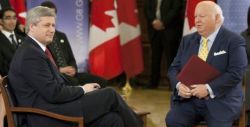Coop média de Montréal
Journalisme indépendant
Leaked Harper PMO Senate Document Sheds Light on Unique Terminology
The latest document in the breaking Canadian Senate scandal is reproduced in full below for Mediacoop.ca readers. It appears to be a glossary of terms for internal use at the Prime Minister’s Office to help staffers make sense of a rapidly developing story with an even more rapidly changing PMO terminology.
PMO Senate Scandal Glossary (for internal distribution only)
Acted alone
This is a very flexible term. It can mean that a person “acted entirely on his or her own,” “acted with very few people in the know,” “with a handful of people in the know” or, at the extreme limit, “acted with the knowledge of pretty much everybody in the PMO and the Conservative Senate caucus leadership while informing the Prime Minister in broad terms only.” As in “Nigel Wright acted alone to provide the funds to reimburse Senator Duffy’s bogus expenses.”
Good to go
A phrase commonly used in the Prime Minister’s Office to note that consent has been given to a course of action where the person giving the consent is informed in broad terms only, thus allowing for plausible deniability as to the (potentially incriminating) specifics of the course of action. As in “We are good to go from the PM” (from a February 2013 email from Nigel Wright to PMO staffers regarding the repayment of Senator Duffy’s bogus expenses).
In broad terms only
In general, when communicating with the Prime Minister about anything potentially incriminating, his staff are directed to use terms that allow for plausible deniability. Speaking in such a fashion is referred to as speaking “in broad terms only.” For instance, if you need to inform the Prime Minister about a slush fund payoff to make a problem go away, about the whitewashing of an audit, or for that matter, about a robocall vote-suppression scheme, be sure to speak in broad terms only. As in “The PM knows, in broad terms only, that I personally assisted Duffy when I was getting him to repay the expenses” (from an email sent by Nigel Wright on May 14, 2013, the day before the Prime Minister said he first learned of the Duffy repayment scheme).
Personally assisted
This term describes a situation in which one party uses means at his or her own personal disposal (for which that party may or may not be reimbursed by a Conservative Party slush fund at a later date) to help another party. As in “The PM knows, in broad terms only, that I personally assisted Duffy when I was getting him to repay the expenses” (from an email sent by Nigel Wright on May 14, 2013, the day before the Prime Minister said he first learned of the Duffy repayment scheme).
Plausible deniability*
This is a term borrowed from our friends in the CIA who use it in the context of clandestine operations that involve violations of international laws and conventions. Generally, when our operations involve anything potentially incriminating we must allow the Prime Minister the possibility of denying any knowledge of the operations that occurred under his authority. Providing this possibility is referred to as providing “plausible deniability.” As in, “This agreement to provide $90,000 from the PMO Chief of Staff for the repayment of the inappropriate expenses incurred by the Senator has been given the good to go by the PM, but in broad terms only. There is no way that the Prime Minister can be incriminated by the agreement; he has plausible deniability.” *Important: this term is for internal use only.
Resigned
Usually this is a term used to indicate that a person has voluntarily left his or her post, as in the following example: “It was his [Nigel Wright’s] personal decision and he did this in his capacity of chief of staff, so he is solely responsible and that is why he has resigned.” (from a statement made by the Prime Minister in response to a journalist in Peru on May 22, 2013*). However, we must occasionally redefine “resigned” to mean “fired.” This term can be as flexible as acted alone. Thus, in October 2013 the Prime Minister said on Halifax radio “As you know I had a chief of staff who made an inappropriate payment to Mr. Duffy. He was dismissed.”
* The lesson from the Peru fiasco is that the Prime Minister should never take questions from journalists even from foreign journalists far away from Canadian scandals because they sometimes follow Canadian stories online.
David Bernans is a Québec-based writer and translator. He is the author of Collateral Murder. Follow him on twitter @dbernans.
Author’s Note: This article is satirical, but not really that far from the truth when you think about it.
About the poster
The site for the Montreal local of The Media Co-op has been archived and will no longer be updated. Please visit the main Media Co-op website to learn more about the organization.




